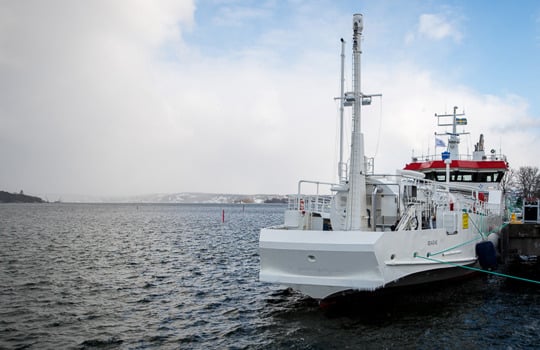Gasum’s green shipping on demand makes reducing emissions for shipping companies profitable
Gasum’s green shipping on demand is a unique service that enables shipping companies to purchase renewable biogas for fuel according to demand from their own customers. It is a way to make emission reductions profitable. This is especially important as the FuelEU Maritime initiative and the EU Emission Trading System means the whole maritime sector faces massive changes in their operational and regulative environment in the coming years.
In June 2023, Finnish shipping company Viking Line announced that its passengers could now choose to reduce their emissions by purchasing renewable liquefied biogas (LBG) in proportion to the amount of fuel used for their journey. The option is enabled by Gasum’s green shipping on demand service for shipping companies.
“Green shipping on demand means that our customers can purchase renewable biogas according to the demand from their customers. This eliminates the price risk our customers take as the costs can be passed directly to their customer and further to the end customer,” says Jacob Granqvist, Vice President of Gasum Maritime.
The amount of biogas supplied can be calculated according to the intended emission reduction. For example, if the customer needs to transport a hundred passengers or ten containers without carbon emissions, Gasum can supply them with enough biogas to do so.
Green shipping on demand is efficient and cost-efficient
Demand for this kind of on-demand service currently comes mainly from B2C companies that have customers asking for emission-free transport options.
The cost of transport is just a fraction of the cost the end-customer pays for the product or the service. For example, for Viking Line’s customers the additional price of reducing the emissions from their travel is less than 5 euros.
“It is typical that the change is driven by B2C companies. Going forward, however, the customer base will expand. Green shipping on demand makes reducing emissions a profitable business opportunity,” says Granqvist.
Gasum can provide the service to all shipping companies that have vessels running on liquefied natural gas (LNG) as LNG and LBG are interchangeable. Using LBG as a maritime fuel can reduce a vessel’s carbon emissions by up to 90% compared to oil-based fuels.
“We are currently the only company offering green shipping on demand in the LNG segment. In addition to emission reductions, this is a way for our customers to cover the expenses caused by the new emission regulations for the maritime sector,” says Granqvist.
FuelEU Maritime and EU ETS require changes from the maritime sector
The shipping industry will go through massive changes in the coming years as the the Fit for 55 package is extended to include the maritime sector. The regulations known as FuelEU Maritime will come into effect in 2025, setting the whole sector requirements for emission reductions.
In 2024, the maritime sector will also be included in the EU Emission Trading System (EU ETS).
As a comprehensive energy company Gasum has an extensive track record in tailoring emission reduction services for different customers in various sectors and industries.
Shipping companies can also benefit from Gasum’s long history in emission trading as the EU ETS is a political and volatile system that requires expertise.
“We specialize in tailoring solutions for our customers. In addition to managing the whole methane value chain, we can offer our customers services that help them navigate the evolving regulatory environment cost-effectively,” says Granqvist.
Read more: Gasum Portfolio Services is your expert in EU ETS



